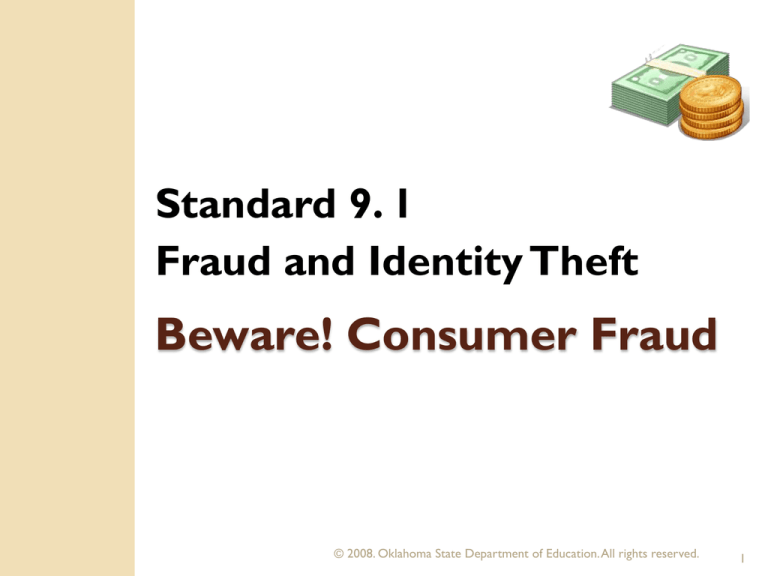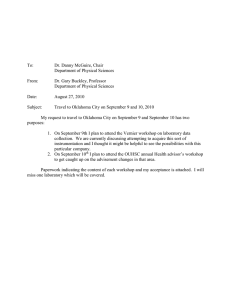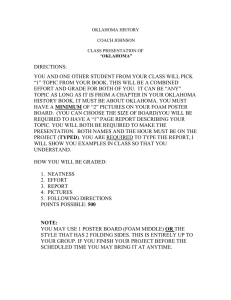
Standard 9. 1
Fraud and Identity Theft
Beware! Consumer Fraud
© 2008. Oklahoma State Department of Education. All rights reserved.
1
Building Interest
Offers come to us everyday:
• Through the mail
• Over the telephone
• Through E-mail
• Over the Internet
Ultimate goal of scammers:
• Get our money!
© 2008. Oklahoma State Department of Education. All rights reserved.
2
Vocabulary
Federal Trade Commission – A federal
Agency that enforces consumer
protection.
Fraud – Someone who knowingly
deceives you for their own personal gain.
Identity Theft – Using a person’s name or
personal information without the person’s
permission to steal money or get other
benefits.
© 2008. Oklahoma State Department of
Education. All rights reserved.
3
Most common types of fraud
Bait and switch
Bankruptcy Fraud
Confidence trick or confidence game
Embezzlement
False Advertising
False Billing
Forgery
© 2008. Oklahoma State Department of
Education. All rights reserved.
4
Most common types of fraud
Health fraud
Identity theft
Insurance fraud or false insurance claims
Long firm
Marriage Fraud
Ponzi Scheme or Pyramid Scheme
Security Fraud
© 2008. Oklahoma State Department of
Education. All rights reserved.
5
Is Fraud a Crime?
Yes, any form of fraud is a
criminal act and anyone
knowingly participating in
it can be prosecuted.
It is also a violation of civil
law. A civil fraud generally
means that someone
intentionally set out to
deceive another person for
gain.
© 2008. Oklahoma State Department of Education. All rights reserved.
6
Tips to avoid being a victim of fraud
The greater the potential return, the
greater the risk.
Investments seldom exist without risk
involved.
Always get all the information in writing
before you give any money.
Never let your emotions interfere with
your business affairs.
© 2008. Oklahoma State Department of
Education. All rights reserved.
7
Tips to avoid being a victim of fraud
Never invest what you cannot afford to
lose.
Legitimate offers will always be there
tomorrow.
Take time to do careful research.
If an offer sounds too good to be true, it
probably is.
Do not send cash by mail, bank transfer,
or messenger.
© 2008. Oklahoma State Department of
Education. All rights reserved.
8
Protecting Yourself from
Consumer Fraud
The best guard against consumer
fraud is awareness.
Bottom line:
If something seems too good
to be true, it probably is!
© 2008. Oklahoma State Department of Education. All rights reserved.
9
Steps to Take if Victimized
The Federal Trade Commission
recommends the following actions if you become
a victim:
• Contact the Fraud Division of the three credit
bureaus.
• Contact credit card companies or the issuers
of any other cards that were affected.
• File a complaint with the Federal Trade
Commission.
• Contact the your local police.
• Contact State Attorney General’s Office
© 2008. Oklahoma State Department of Education. All rights reserved.
10
Steps to Take if Victimized
In Oklahoma, the best place to
start is by calling the Office of
the Attorney General at 405521-3921 or 918-581-2885
© 2008. Oklahoma State Department of Education. All rights reserved.
11
Earnings
Consumer fraud has a major impact
on consumers and on the overall
economy of the United States.
According the FTC survey on
consumer fraud in 2004, people with
moderate to low incomes and lower
levels of education are more likely to
be victims; however, anyone can
become a victim.
© 2008. Oklahoma State Department of Education. All rights reserved.
12
Earnings
When it comes to your money and your
personal information, trust only those
people you know to be trustworthy.
If you do become a victim, take immediate
steps to contact law enforcement officials.
© 2008. Oklahoma State Department of Education. All rights reserved.
13
Pop Tart!!!!!
Identify and describe three
common types of fraud.
Identify three things you can do
to avoid becoming a fraud victim.
What should you do if you
suspect you are a victim of fraud?
© 2008. Oklahoma State Department of Education. All rights reserved.
14
Standard 9. 2
Fraud and Identity Theft
Beware! Identity Theft
© 2008. Oklahoma State Department of Education. All rights reserved.
15
How do they do it?
ID thieves use many methods:
• Dumpster Diving
• Skimming
• Phishing
• Changing Your Address
• Stealing
• Pretexting
• Hacking
© 2008. Oklahoma State Department of Education. All rights reserved.
16
How do they do it?
How can you protect yourself from ID
theft?
• Monitor your billing statements and
your bank statements each month.
• Check your credit report on a regular
basis.
• Subscribe to one of several business
services that will monitor your monthly
payments on a regular basis.
© 2008. Oklahoma State Department of Education. All rights reserved.
17
How to Protect Yourself
from ID Theft
Safety measures you may want to
consider:
• Use passwords on your credit card, bank and
cell phone accounts.
• Put your personal information in a secure
place.
• Only enter personal data on secure web sites.
• Shred all papers with your personal
information before throwing them in the
trash.
© 2008. Oklahoma State Department of Education. All rights reserved.
18
How to Protect Yourself
from ID Theft
Safety measures you may want to
consider: (continued)
• NEVER give out any personal information on
the phone, through the mail, on the Internet, in
an email or in person unless you are sure with
whom you are dealing.
• Avoid cutting and pasting or clicking web links
from emails, unless you are certain it is a valid
link.
• Place your outgoing U.S. mail in a postal mail
drop or take it to the post office.
© 2008. Oklahoma State Department of Education. All rights reserved.
19
How to Protect Yourself
from ID Theft
Safety measures you may want to
consider: (continued)
• Leave your Social Security Number card in
a secure place.
• Be careful about giving out your Social
Security number or using it as an ID
number.
• Carry only the identification information and
the credit/debit cards you actually need.
• Avoid responding to promotions.
© 2008. Oklahoma State Department of Education. All rights reserved.
20
How to Protect Yourself
from ID Theft
Safety measures you may want to
consider: (continued)
• Keep your purse or billfold in a safe place
at school and at work.
• Order a copy of your credit report from the
three primary credit bureaus to monitor
your credit history.
© 2008. Oklahoma State Department of Education. All rights reserved.
21
Steps to Take if Victimized
If you become the
victim of a fraud or
even suspect you
might be, let your
parents know and
contact your local law
enforcement officials
immediately.
© 2008. Oklahoma State Department of Education. All rights reserved.
22
Steps to Take if Victimized
The Federal Trade Commission
recommends the following actions if you become
a victim:
• Contact the Fraud Division of the three credit
bureaus.
• Contact credit card companies or the issuers
of any other cards that were affected.
• File a complaint with the Federal Trade
Commission.
• Contact the local police.
• Contact State Attorney General’s Office
© 2008. Oklahoma State Department of Education. All rights reserved.
23



